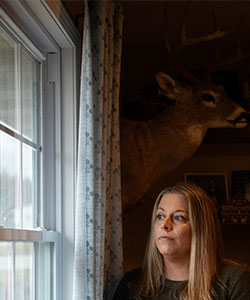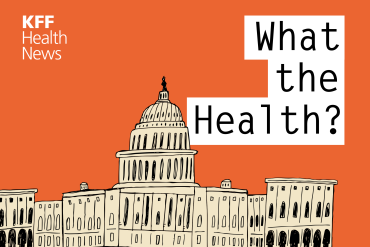KFF Health News' 'What the Health?': Arizona Turns Back the Clock on Abortion Access
A week after the Florida Supreme Court said the state could enforce an abortion ban passed in 2023, the Arizona Supreme Court ruled that state could enforce a near-total ban passed in 1864 — over a half-century before Arizona became a state. The move further scrambled the abortion issue for Republicans and posed an immediate quandary for former President Donald Trump, who has been seeking an elusive middle ground in the polarized debate. Alice Miranda Ollstein of Politico, Rachel Cohrs Zhang of Stat, and Rachel Roubein of The Washington Post join KFF Health News’ Julie Rovner to discuss these stories and more. Also this week, Rovner interviews KFF Health News’ Molly Castle Work, who reported and wrote the latest KFF Health News-NPR “Bill of the Month” feature, about an air-ambulance ride for an infant with RSV that his insurer deemed not medically necessary.
KFF Health News' 'What the Health?': The Supreme Court and the Abortion Pill
The Supreme Court this week heard its first abortion case since overturning Roe v. Wade in 2022, about an appeals court ruling that would dramatically restrict the availability of the abortion pill mifepristone. But while it seems likely that this case could be dismissed on a technicality, abortion opponents have more challenges in the pipeline. Meanwhile, health issues are heating up on the campaign trail, as Republicans continue to take aim at Medicare, Medicaid, and the Affordable Care Act — all things Democrats are delighted to defend. Alice Miranda Ollstein of Politico, Sarah Karlin-Smith of the Pink Sheet, and Lauren Weber of The Washington Post join KFF Health News chief Washington correspondent Julie Rovner to discuss these issues and more. Also this week, Rovner interviews KFF Health News’ Tony Leys, who wrote a KFF Health News-NPR “Bill of the Month” feature about Medicare and a very expensive air-ambulance ride. Plus, for “extra credit,” the panelists suggest health policy stories they read this week they think you should read, too.
KFF Health News' 'What the Health?': The Supreme Court vs. the Bureaucracy
The Supreme Court this week heard oral arguments in a case that could radically alter the way federal agencies — including the Department of Health and Human Services — administer laws passed by Congress. A decision in the case is expected this spring or summer. Meanwhile, the Biden administration is struggling over whether to ban menthol cigarettes — a move that could improve public health but also alienate Black voters, the biggest menthol users. Joanne Kenen of Johns Hopkins University and Politico Magazine, Lauren Weber of The Washington Post, and Rachel Cohrs of Stat join KFF Health News chief Washington correspondent Julie Rovner to discuss these issues and more. Also this week, Rovner interviews Darius Tahir, who reported and wrote the latest KFF Health News-NPR “Bill of the Month” feature about a lengthy fight over a bill for a quick telehealth visit.
In Year 6, KFF Health News-NPR’s ‘Bill of the Month’ Helps Patients in a Changing System
In the sixth year of the KFF Health News-NPR “Bill of the Month” series, patients shared more than 750 tales of medical billing problems, and reporters analyzed more than $730,000 in charges — including more than $215,000 owed by 12 patients and their families.
When a Quick Telehealth Visit Yields Multiple Surprises Beyond a Big Bill
For the patient, it was a quick and inexpensive virtual appointment. Why it cost 10 times what she expected became a mystery.
Out for Blood? For Routine Lab Work, the Hospital Billed Her $2,400
Convenient as it may be, beware of getting your blood drawn at a hospital. The cost could be much higher than at an independent lab, and your insurance might not cover it all.
When That Supposedly Free Annual Physical Generates a Bill
Completing a routine depression screening questionnaire during an annual checkup is cost-free under federal law. But, as one woman discovered, answering a doctor’s follow-up questions might not be.
She Received Chemo in Two States. Why Did It Cost So Much More in Alaska?
A breast cancer patient who received similar treatments in two states saw significant differences in cost, illuminating how care in remote areas can come with a stiffer price tag.
She Paid Her Husband’s Hospital Bill. A Year After His Death, They Wanted More Money.
A widow encountered a perplexing reality in medical billing: Providers can come after patients to collect well after a bill has been paid.
His Anesthesia Provider Billed Medicare Late. He Got Sent to Collections for the $3,000 Tab.
Medicare was supposed to cover the entire cost of his procedure. But after the anesthesia provider failed to file its claims in a timely manner, it billed the patient instead.
A Mom Owed Nearly $102,000 for Hospital Care. Her State Attorney General Said to Pay Up.
As politicians bash privately run hospitals for their aggressive debt collection tactics, consumer advocates say one North Carolina family’s six-figure medical bill is an example of how state attorneys general and state-operated hospitals also can harm patients financially.
























